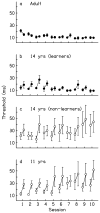Late maturation of auditory perceptual learning
- PMID: 21477199
- PMCID: PMC3107547
- DOI: 10.1111/j.1467-7687.2010.01009.x
Late maturation of auditory perceptual learning
Abstract
Adults can improve their performance on many perceptual tasks with training, but when does the response to training become mature? To investigate this question, we trained 11-year-olds, 14-year-olds and adults on a basic auditory task (temporal-interval discrimination) using a multiple-session training regimen known to be effective for adults. The adolescents all began with performance in the adult range. However, while all of the adults improved across sessions, none of the 11-year-olds and only half of the 14-year-olds did. The adolescents who failed to learn did so even though the 10-session training regimen provided twice the number of sessions required by adults to reach asymptotic performance. Further, over the course of each session, the performance of the adults was stable but that of the adolescents, including those who learned, deteriorated. These results demonstrate that the processes that underlie perceptual learning can continue to develop well into adolescence.
Figures


Similar articles
-
Long-Term Training-Induced Gains of an Auditory Skill in School-Age Children As Compared With Adults.Trends Hear. 2018 Jan-Dec;22:2331216518790902. doi: 10.1177/2331216518790902. Trends Hear. 2018. PMID: 30062912 Free PMC article.
-
Perceptual learning: how much daily training is enough?Exp Brain Res. 2007 Jul;180(4):727-36. doi: 10.1007/s00221-007-0898-z. Epub 2007 Feb 27. Exp Brain Res. 2007. PMID: 17333009
-
Neural Variability Limits Adolescent Skill Learning.J Neurosci. 2019 Apr 10;39(15):2889-2902. doi: 10.1523/JNEUROSCI.2878-18.2019. Epub 2019 Feb 12. J Neurosci. 2019. PMID: 30755494 Free PMC article.
-
Less is more: latent learning is maximized by shorter training sessions in auditory perceptual learning.PLoS One. 2012;7(5):e36929. doi: 10.1371/journal.pone.0036929. Epub 2012 May 14. PLoS One. 2012. PMID: 22606309 Free PMC article. Clinical Trial.
-
Auditory perceptual learning and changes in the conceptualization of auditory cortex.Hear Res. 2018 Sep;366:3-16. doi: 10.1016/j.heares.2018.03.011. Epub 2018 Mar 12. Hear Res. 2018. PMID: 29551308 Review.
Cited by
-
Different patterns of perceptual learning on spectral modulation detection between older hearing-impaired and younger normal-hearing adults.J Assoc Res Otolaryngol. 2013 Apr;14(2):283-94. doi: 10.1007/s10162-012-0363-y. Epub 2012 Dec 11. J Assoc Res Otolaryngol. 2013. PMID: 23229719 Free PMC article.
-
Auditory training during development mitigates a hearing loss-induced perceptual deficit.Front Syst Neurosci. 2014 Apr 4;8:49. doi: 10.3389/fnsys.2014.00049. eCollection 2014. Front Syst Neurosci. 2014. PMID: 24772071 Free PMC article.
-
Separable developmental trajectories for the abilities to detect auditory amplitude and frequency modulation.Hear Res. 2011 Oct;280(1-2):219-27. doi: 10.1016/j.heares.2011.05.019. Epub 2011 Jun 2. Hear Res. 2011. PMID: 21664958 Free PMC article.
-
Auditory sequence analysis and phonological skill.Proc Biol Sci. 2012 Nov 7;279(1746):4496-504. doi: 10.1098/rspb.2012.1817. Epub 2012 Sep 5. Proc Biol Sci. 2012. PMID: 22951739 Free PMC article.
-
Auditory processing remains sensitive to environmental experience during adolescence in a rodent model.Nat Commun. 2022 May 24;13(1):2872. doi: 10.1038/s41467-022-30455-9. Nat Commun. 2022. PMID: 35610222 Free PMC article.
References
-
- Alain C, Theunissen EL, Chevalier H, Batty M, Taylor MJ. Developmental changes in distinguishing concurrent auditory objects. Brain Research, Cognitive Brain Research. 2003;16 (2):210–218. - PubMed
-
- Censor N, Karni A, Sagi D. A link between perceptual learning, adaptation and sleep. Vision Research. 2006;46 (23):4071–4074. - PubMed
Publication types
MeSH terms
Grants and funding
LinkOut - more resources
Full Text Sources

